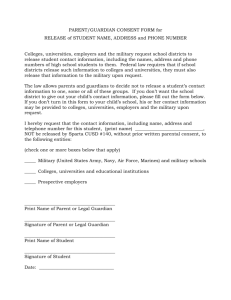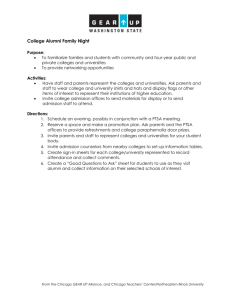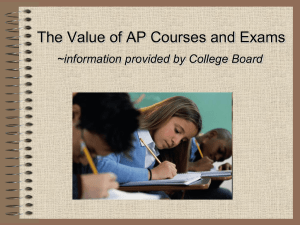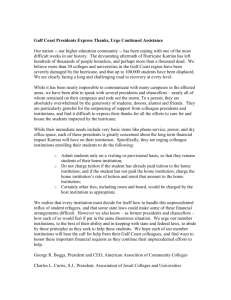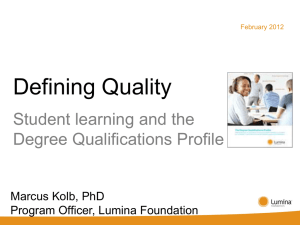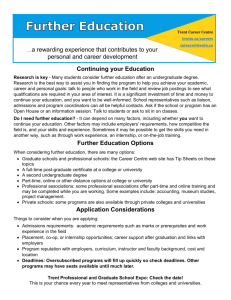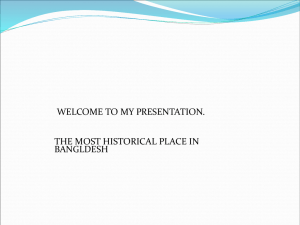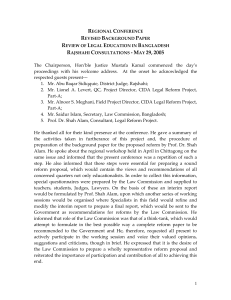Final Roundtable Dhaka Consultation
advertisement
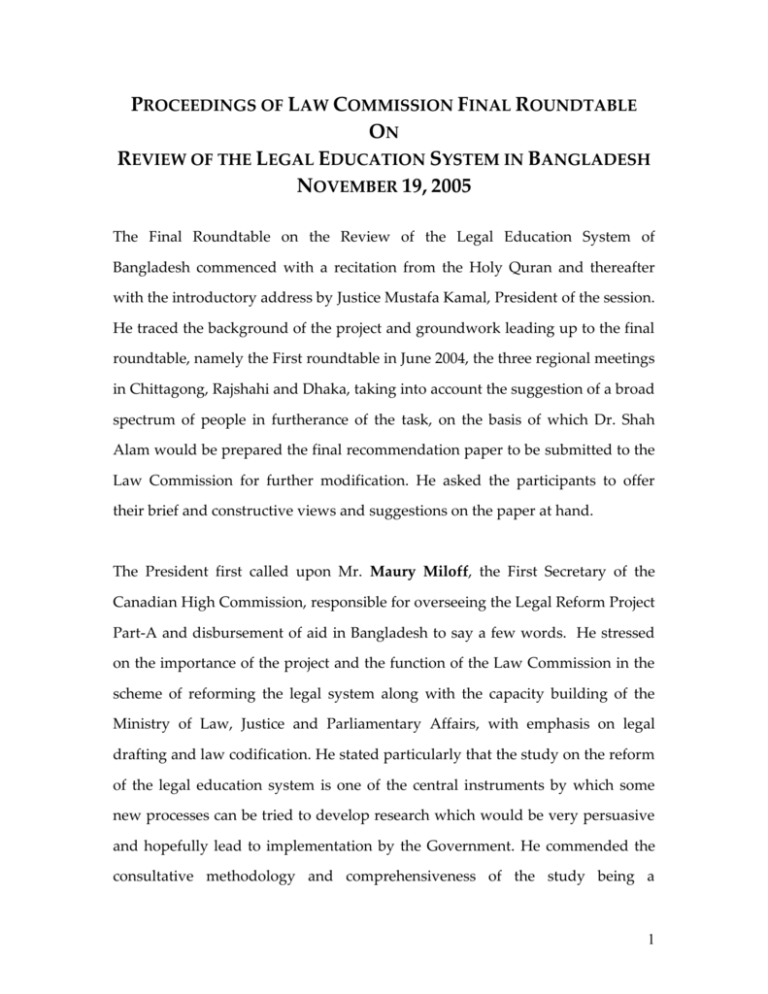
PROCEEDINGS OF LAW COMMISSION FINAL ROUNDTABLE ON REVIEW OF THE LEGAL EDUCATION SYSTEM IN BANGLADESH NOVEMBER 19, 2005 The Final Roundtable on the Review of the Legal Education System of Bangladesh commenced with a recitation from the Holy Quran and thereafter with the introductory address by Justice Mustafa Kamal, President of the session. He traced the background of the project and groundwork leading up to the final roundtable, namely the First roundtable in June 2004, the three regional meetings in Chittagong, Rajshahi and Dhaka, taking into account the suggestion of a broad spectrum of people in furtherance of the task, on the basis of which Dr. Shah Alam would be prepared the final recommendation paper to be submitted to the Law Commission for further modification. He asked the participants to offer their brief and constructive views and suggestions on the paper at hand. The President first called upon Mr. Maury Miloff, the First Secretary of the Canadian High Commission, responsible for overseeing the Legal Reform Project Part-A and disbursement of aid in Bangladesh to say a few words. He stressed on the importance of the project and the function of the Law Commission in the scheme of reforming the legal system along with the capacity building of the Ministry of Law, Justice and Parliamentary Affairs, with emphasis on legal drafting and law codification. He stated particularly that the study on the reform of the legal education system is one of the central instruments by which some new processes can be tried to develop research which would be very persuasive and hopefully lead to implementation by the Government. He commended the consultative methodology and comprehensiveness of the study being a 1 consensus document reflecting the views of a wide gamut of people which provides the required baseline for implementation. He ended on a congratulatory note expressing his happiness at the progress of the project and the results achieved. The President then invited Dr. Shah Alam, Professor, Faculty of Law, Chittagong University to present the discussion paper. In his address he said that though previously recommendations were made to the Government no action was taken but was pleased that the initiative of a credible agency such as Law Commission has taken up the task and would be able to pursue and convince the Government of the necessity for reforms and eventually some concrete steps would be taken. He drew attention to the methodology of the work which involved the various stakeholders in legal education, which enabled the procurement of maximum material and solicitation of recommendations, resulting in a discussion paper consisting of the systematic compilation of the input of the stakeholders. This methodology would add weight to the final paper of the Law Commission as the reflection of the desires of the people concerned thereby influencing the Government to implementation. He then proceeded to highlight the main agenda for discussion: The ‘objectives’ of legal education, meaning, what national goals would be pursued in legal education. The ‘nature’ of legal education, whether it would be vocational or academic or both, and how the two streams can be blended to get the maximum benefit of legal education. The ‘standard’ or norms for quality legal education keeping in line with the objectives and nature of legal education, and by whom these standards 2 would be defined and maintained—the Bar Council, the Government or the UGC. The ‘harmonisation’ of the various institutional approaches of legal education, i.e. public and private legal education and university and college legal education. The ‘uniformity’ of legal education in respect of curriculum, teaching methodology, grade variation, duration, pre-qualification for admission, evaluation etc., with special emphasis on ‘curriculum development’. The novel concept of ‘clinical legal education’ which combines practical legal training with community service. Incorporating ‘ethical values’, ‘human rights’ and ‘gender sensitivity’ approaches in legal education. Incorporating ‘comprehensive research methodology’ and ‘transnational issues’ in legal education. The solution to the ‘language problem’ in legal education. The feasibility of ‘continuing legal education’. Development of ‘job opportunities’ for enlightened law graduates to build up a specialized cadre, for e.g.—BCS Legal, and social engineering mechanism. The role and importance of Bar Council and UGC in legal education to form a ‘national controlling and monitoring body’ of legal education. The viability of ‘basic legal education’ to create mass awareness of law and rights. Having discussed the above points Dr. Shah Alam concluded his speech. 3 Thereupon the Chairman gave the floor to the following esteemed participants to make their comments. 1. Justice Hamidul Haque, Director General, JATI suggested that as regards ‘language’ the medium of instruction at the undergraduate level should be Bangla and in the post-graduate level it should be English; as regards the ‘duration’ of the course he suggested that it should not be more than three years keeping in view the socio-economic condition of our country; the subjects normally included in the undergraduate course should be concise and at the post-graduate level more specialized subjects should be included; he further suggested that vocational training should be included, which may be extended up to one year, whether it be imparted by the universities or a special body such as the Bar Council; he expressed doubts as to the utility and necessity of a legal service; lastly he suggested that there should be some sort of restriction as to enrollment so the quality of the lawyers may be improved and there should be adequate benefits should be provided to people in the judicial service to check corruption instead of solely relying on the teaching of legal ethics. 2. Dr. Kamal Hussain, preferring to view the current state of legal education as a pitcher which is half full suggested that facilities of modern technology should be provided to students of law; he ruled out the idea of a national monitoring and controlling body for legal education favoring the strengthened role of the Bar Council in this respect to provide quality professionals; he supported the role of the UGC for monitoring legal education in the public universities and emphasized that whatever the body it should comprise people of professional excellence in order to 4 ensure the excellence in the academic institutions; he highlighted the need for checking the disease of corruption in the judicial system which seeps into the education system; speaking on the parallel system of legal education prevailing in the country today he said that accessibility to education is a major crisis in a country and a solution has to be found to combine excellence and accessibility; he underlined the problem of commercialization of legal education, especially the mushroom growth of law colleges and suggested that timely and adequate steps must be taken to check this problem in order to ensure quality of legal education; stressing on the qualities of a legal professional he suggested that the public universities, especially the faculty, have to be strengthened and provision f scholarships for meritorious students should be made. Dr. Hussain mostly accentuated on the need for ensuring the best education for the best students overcoming the obstacle of the socio-economic status. He further added that a minimum standard of quality and excellence of education in the law colleges must be ensured as long as a ‘two-tier’ education system is prevalent in our country. Lastly commenting on the viability of basic legal education he said that a proper curriculum must be formulated to achieve the desired goals. He strongly opined on the need for appropriate evaluation of law graduates as the present standard of evaluation leaves much to be desired. He suggested that there could be an ‘institute for advanced legal studies’ which would have a very high standard of excellence of for post-graduate studies and Ph.D., drawing the best students from the graduate level. He expressed his disappointment at the present state of judiciary and stated that highest level of excellence must be inherent in judges responsible for administering justice because it 5 is their function that shapes the legal system of the country which in turn influences the legal education system. 3. Dr. Tareq M.R.Chowdhury, Chairman, Department of Law and Dean of Arts and Social Sciences, Southeast University, offered his views on the standard of legal education provided in private universities dispelling general negative conceptions on the matter. He suggested that the twoyear LLB Pass Course be totally abolished. The improvement of the students must be monitored and the system of term paper should be introduced; such legal literature must be created that is adapted to our situations comprising Bangladeshi case-laws as we need our own tools; the term Barrister should be abolished as it confuses the students; the curriculum in the private universities is modern and its system is more flexible unlike the fossilized public universities. He suggested the creation of a national school of Bangladesh a pacesetting model, which would foster initiative, drive, commitment and quality of legal education. 4. Justice Afzal congratulated Dr. Shah Alam on the preparation of the discussion paper which is insightful both in quality and content. He suggested that the recommendations should be more elaborate, specific and direction-oriented. One of the major ills plaguing our legal education system is the anarchical systems and practices prevailing in the public and private universities and law colleges where uniformity, accountability and central monitoring have been found to be lacking which other countries have achieved by various means. He stated that in the point of the desirability and success of the law school of India model for five years undergraduate course and one year post graduate course and vocational 6 education at various levels and the bodies or agencies responsible for overseeing these matters more specific recommendations have to be formulated whereby the institutes themselves are aware of what are required of them; the role of a central monitoring committees such as the Bar Council must be clearly spelt out and necessary steps legal and otherwise must be recommended in this regard. The inter-disciplinary curriculum approach and transnational dimension of the legal profession which are desirable for uplifting our legal education call for some objective and directional recommendations drawing upon the experience of foreign universities; there should be a constant updating of our national curriculum and flexibility to accommodate new situations as and when they occur. Strong recommendations should be there to control, regulate the mushrooming of the private law colleges. He elaborated on the Victorian University of Wellington vision-plan citing it as an example. In sum he suggested further examination and elaboration on the points presented in the discussion paper. 5. Dr. Mizanur Rahman in his speech commented firstly on the structure of legal education which currently consists of three streams—public university, private university and law colleges and suggested that more concentration should be directed to the education of private universities and law colleges and it should be examined whether the law colleges can be brought under the territorial jurisdiction of the public universities to supervise and monitor the quality of legal education in the country. Secondly as regards the curriculum of the legal education he opined that it must be socially responsible and pro-people legal curriculum to be effective. Thirdly on the point of who impart legal education he suggested 7 that a minimum pre-qualification and training be laid down to ensure the qualitative teaching of legal education. He doubted utility of the system of evaluation of teachers by students saying that it contributes to compromises the quality of education imparted. Fourthly he emphasized on the necessity for an effective and systematic clinical legal education program and suggested that more detailed suggestions should be made for implementing proper ‘training for the teachers of law’. He stated that there is no need for an independent national monitoring body and Bar Council being the statutory authority is the appropriate agency for ensuring this end. On the point of the ‘bilingual hazard’ Dr. Mizanur Rahman opined that adequate facilities should be provided to the law graduates to develop their proficiency in both English and Bengali. he strongly supported the inter-disciplinary approach of legal education in order to make it socially responsible. He opposed the extension of the undergraduate course to five years from the existing four years but supported the extension of the duration of the LLM Course to two years from one year. On this note he concluded his speech. 6. Ambassador Waliur Rahman, Representative of BILIA, suggested that the curriculum of legal education should start from the basic level; the legal education system should be elemental in the dispensation of justice; the curriculum should include matters related to the transnational issues, such as—WTO dispute mechanisms also juvenile delinquency training , human rights education, consumer protection laws etc; pro-gender legal instruments should be implemented and practiced; ADR should be an integral part of legal education; the idea of a National Council should be dropped; pro-people approach should be incorporated in the education; 8 on the matter of language he stated that English should be given the highest emphasis from the inception of formal education and the honours course should remain at the period of four years. 7. Dr. Zakir Hossain, Dean, Faculty of Law, Chittagong University, made certain recommendations on the matter of curriculum development, recruitment of teachers, development of faculty, evaluation of students. 8. Barrister Shafiq Ahmed, former President , Supreme Court Bar Association, spoke about the quality of education in private universities and private colleges and suggested that certain entry qualifications must be ascertained; he commented on the ineffective system of evaluation of merit of students and suggested that here too a minimum standard should be laid down on the basis of which evaluation can be carried out; recruitment procedure of teachers in private universities and law colleges should be altered to ensure transparency and excellence of the faculty; the mushroom growth of law colleges should be checked to ensure the quality of legal education; he strongly opined that the dearth of adequate legal materials is a big obstacle for students and for this reason English should be followed as the medium of instruction so that students may have access to more materials; he emphasized the need for curriculum development not necessarily incorporating more subjects but instead subjects that serve the objectives of legal education. The Honourable Chairman of the session then briefly outlined the main concerns of the final discussion:- 9 a) Whether there should be a uniform curriculum for all the private and public universities and law colleges? b) What would be the mechanism of introduction of this curriculum—by law or by different senates and academic councils of different universities and colleges or by umbrella legislation? In addition to this Dr. Shah Alam said that any change or modification in the curriculum would have to be under the supervision of and recognized by the Bar Council. 9. Dr. Borhanuddin Khan, Professor, Department of Law, Dhaka University suggested that the history of legal education should be traced; long-term and short-term goals should be set out to define the implementation mechanisms; he suggested that the reform should be brought about by an umbrella legislation under the administration of the Bar Council to produce qualified and acceptable law graduates; he suggested that the gaps in the matter of legal research be identified. 10. Asma Siddiqa, Dean, Department of Law, Rajshahi University clarified the state of legal education in Rajshahi University and spoke about the plight of legal education in the public universities especially with regard to financial and political constraints. She suggested that there should be a proper curriculum and more importantly proper training for teachers so they are better equipped to impart quality legal education, be it academic or vocational. 10 11. Justice K.M.Sobhan commented that there should be a standard salary for all judges. On the point of the medium of instruction he suggested that the teaching of English should begin at the school level; he opined that the pass grade for undergraduate students should be at point which will reasonably ensure quality; he strongly supported that new subjects should be included in the curriculum and for this purpose the profession should be divided into groups so that the students can pursue their education accordingly; he stressed on the issue of ADR as a subject in the course; the pre-qualification for admission into the LLB course and limited number of seats should be laid down so that merit-based evaluation takes place; he suggested that evaluation of teachers should be dome by some independent bodies; he also supported the training of teachers as well as lawyers and judges to improve the overall system; he commended the idea of providing job opportunities for law graduates. 12. Shoma Islam, Head of the Advocacy and PIL Cell of BLAST suggested that there should be greater collaboration between the universities, NGOs and the Bar Council to bring about effective and people oriented changes in the legal education system; she commented that there should be a roadmap and the recommendations should be divided into short-term, midterm and long-term accordingly; legal education should be emphasized for law enforcement agents and public representatives in different spheres as they play an instrumental role in the system; emphasis should be laid on PIL in the courses for students. 13. Mina Goswami, Representative of ASK, proposed that the CLEP program should be continued by public and private universities alike so that they 11 are involved with legal mechanisms in a practical way; she also suggested that human rights subjects should be included at the under graduate level. 14. Justice Teffazal Islam, Appellate Division, spoke about the pitiable conditions of the law colleges and legal education provided there stating that it must be checked. 15. Mr. Yusuf Hussain Humayun, supported the recommendations made in Section :( 12) of the paper. 16. Advocate S. A. Siddqui, Chittagong Law College complained about the step-motherly treatment received from the National University. 17. Justice Anwarul Haque queried whether uniform curriculum can be formulated and implemented through the government law colleges; he spoke about the feasibility of special curriculum for specialization in the final year of under-graduate course; he supported the recommendation of transparent appointment procedure of teachers and training for teachers. Thereafter the Honorable Chairperson concluded the session saying that much work lies ahead and expressed his sincere thanks to the participants for their presence and eager cooperation. 12 The Law Commission Participants at the Final Roundtable Discussion on Legal Education Dhaka, November 19, 2005 1. Mr. Justice Mustafa Kamal Chairman, Law Commission and Former Chief Justice of Bangladesh Chairman of the Final Roundtable Discussion. 2. Professor Dr. Shah Alam Department of Law, Chittagong University - Keynote Speaker of the Final Roundtable Discussion. 3. Justice Serajul Islam, Member, Law Commission 4. Dr. Enamul Hoque, Member, Law Commission 5. Maury Miloff, First Secretary, Canadian High Commission, Dhaka 6. Sheikh Sayedul Islam, Secretary, Law Commission. 7. Dr. Kamal Hossain Senior Advocate of Supreme Court and Member, Legal Education Committee, Bangladesh Bar Council 8. Justice A.T.M. Afzal Former Chief Justice of Bangladesh and Former Chairman of Law Commission, Bnagladesh 9. Justice K.M. Sobhan Former Judge, Appellate Division Supreme Court of Bangladesh 10. Barrister Shafique Ahmed Senior Advocate of Supreme Court and Principal, City Law College, Dhaka 13 11. Dr. Mizanur Rahman Professor, Department of Law University of Dhaka 12. Mr. Zakir Hossain Dean, Faculty of Law University of Chittagong 13. Dr. Borhan Uddin Khan Professor, Department of Law University of Dhaka 14. Mr. Selim Toha Dean, Faculty of Law and Sharia Islamic University, Kushtia 15. Professor Asma Siddiqua Dean, Faculty of Law and Justice University of Rajshahi 16. Mr. Ali Akbar Pramanik Principal, Rajshahi Law College 17. Advocate Muhammad Yusuf Hussain Humayun Member, Legal Education Committee, Bar Council 18. Advocate Muhammad Mohsen Rashid Honorary Coordinator, Bar Vocational Course and Legal Education Training Institute, Bangladesh Bar Council 19. Justice Tafazzul Islam Chairman, Enrollment Committee Bangladesh Bar Council and Honourable Judge of the Appellate Division 20. Justice Md. Hamidul Haque Director General Judicial Administration training Institute 14 21. Advocate Saleh Ahmed Siddique Principal, Chittagong Law College 22. Justice Anwarul Haque Honourable Judge High Court Division of the Supreme Court 23. Representative Bangladesh Legal Aid and Services Trust (BLAST), Dhaka 24. Representative Ain O Salish Kendro (ASK), Dhaka 25. Mr. Waliur Rahman Director, BILIA 26. Dr. Naim Ahmed Advocate, Supreme Court 27. Dr. Tareque M.R. Chowdhury Dean, Faculty of Law South East University, Dhaka 15
